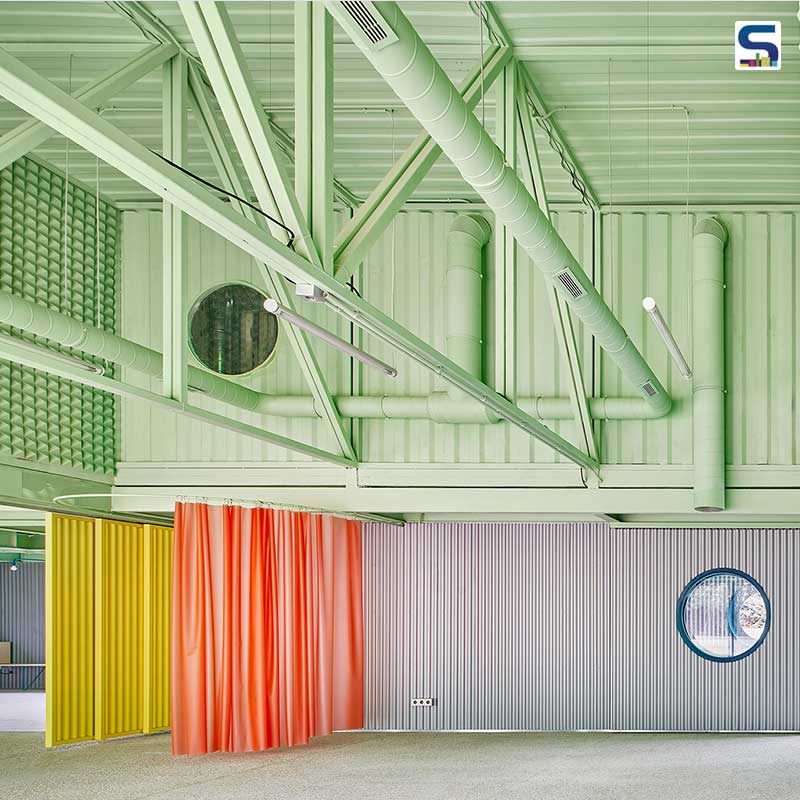
Modified shipping containers are altered into a canine school that addresses the needs and requirements of dogs alongside sheltering other species. Named Educan, this educational multi-species architecture is a training habitat where dogs, humans and other species learn and coexist together.
.jpg)
Located 30km west of Madrid, this colourful training centre has been designed by two Spanish architects Enrique Espinosa, founder, Eeestudio and Lys Villalba. With a common thought of biodiversity in mind, the project reflects on how agricultural buildings, usually relegated to the margins of the discipline, can become exceptional fields for innovation, joining ecology, design and material experimentation. Amidst fields – what was a rural environment once, now urban rich with intensive pesticide-reliant agriculture – the Educan School ‘for dogs, humans and other species is testing ways to recover the harmed ecosystem.
.jpg)
Eva, Carlos, two Belgian Malinois (Bicho and Bomba), Harris the owl, five swift families, six kestrel families and 20 sparrows are all companion species that live and learn together. Unlike other architectural designs, non-humans are not the centre of the design. Instead, its architecture is a multi-species design.
.jpg)
With warehouse-like proportions, Educan is constructed from extra-large shipping containers with about 300 sqm. Spread over one storey, it is bifurcated into three spaces: a training zone, a classroom and the reception area. The two main classrooms cater to dog-human pairs practicing agility or other dog sports like Schutzhund.
.jpg)
Other than boasting ideal views and orientation, the upper floor morphs with a nest façade gratifying birds dwellings. These small birds feed on rodents, thereby maintaining a balance with crops. Other small birds and bats that feed on insects including mosquitoes that carry certain canine diseases inhabit in the south facade. Additionally, sparrows have started nesting in circular holes of the container edges.
.jpg)
The floors are adapted to the pads and joints of animals. Removable rolls of PTE-based synthetic turf are set up in the training classrooms as opposed to the theory classrooms which are furnished in semi-polished, exposed aggregate river pebble-made concrete. To avoid the dogs getting distracted, the interior openings are raised a little more than 1m in height while the louvered window shutters that shade the south façade leave enough space below for dog traffic to the outside. Reducing echo, other noises and reverberation is taken care of with sound-absorbing pyramid foam insulation. Rainwater from the rooftop is harvested in large troughs for dogs and birds.
.jpg)
An amalgamation of a variety of materials in juxtaposition with building techniques including material ecology and waste reduction with the reuse of shipping containers demonstrates the architectural innovation that it is.
.jpg)
As for its colour scheme, vibrant shades of yellow, red, blue and mint green adorn the exteriors of Educan. The colours bring out the homogeneity of industrial materials including metal, steel beams, foam insulation and exposed service ducts.
Project details:
Project: Educan - School for dogs, humans and other species
Client: Adiestramiento Educan
Location: Brunete, Madrid (Spain)
Built area: 300m2
Design date: 2017-2018
Construction date: March, 2019-November, 2020
Architects: Enrique Espinosa (Eeestudio) and Lys Villalba
Construction: Servicios Integrales Alji / Construcciones Metálicas Miguel Torrejon
Team: Javier Renones Marin (building engineer), Mecanismo (structural engineers), Alberto Espinosa (building services engineer), Jorge Lopez Hidalgo (technical consultant), Maria Paola Marciano e Irene Domínguez (collaborators)
Image credits: Javier de Paz Garcia or Jose Hevia
-LQ.jpg)
About the designers
Enrique Espinosa is an architect and co-founder of PKMN architectures (2006-2016), director of Eeestudio since 2016 and professor and researcher at the School of Architecture of Madrid (ETSAM) since 2015. His practice revolves around learning processes and collaborative production, domesticity and public space, working in open networks.
Lys Villalba is an architect, educator and independent researcher, and cofounder of Zoohaus collective. She is an Associate Professor at ETSA Madrid and PhD Candidate at EPSAlicante. Her work explores the intersection of architecture and the social, technological and political realms, and has been recognized with several prizes.